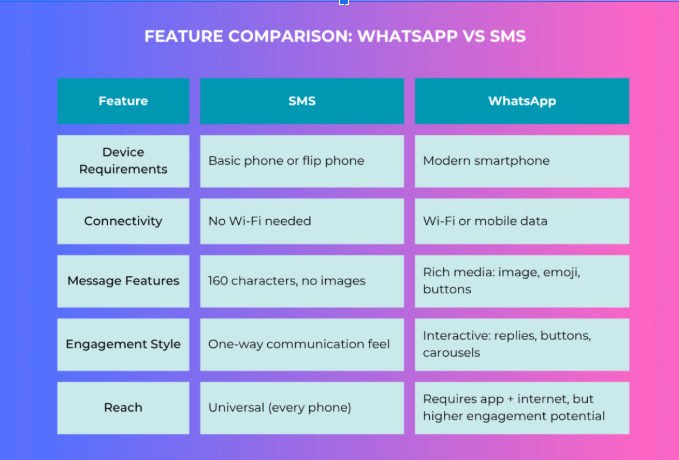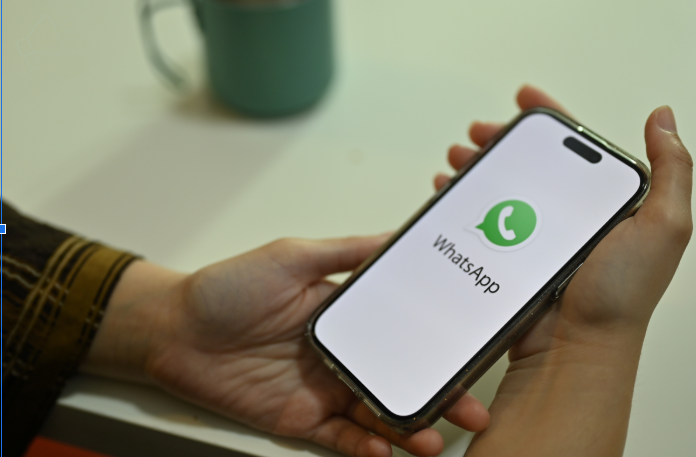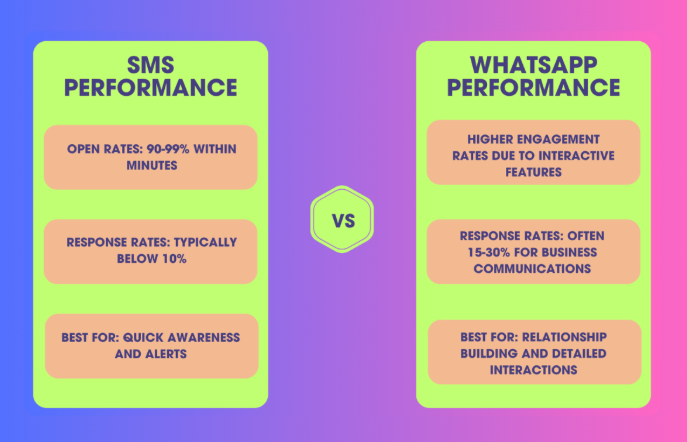August 20, 2025
5 minutes read
SMS Marketing vs WhatsApp Marketing: Choosing the Right Channel for Your Business

Modern businesses face a critical decision when building their messaging strategy: should they invest in SMS or WhatsApp marketing?
Both channels offer powerful ways to reach customers directly on their mobile devices, but each comes with distinct advantages that can make or break your campaign's success.
Understanding the core differences between SMS marketing vs WhatsApp marketing is very important for any business looking to maximize engagement and drive meaningful results in today's mobile-first world. Without further ado, let’s dive into the analysis
SMS vs WhatsApp Marketing: Understanding the Fundamentals
As businesses strive to connect with customers on their preferred platforms, two messaging channels often stand out: SMS and WhatsApp. For starters, we’ll analyze their marketing appeal separately.
What Makes SMS Marketing Unique
SMS marketing represents the traditional powerhouse of mobile messaging. Every mobile phone can receive text messages without requiring internet connectivity or app downloads. This universality has made SMS a reliable foundation for business communications for over two decades.
The simplicity of SMS creates both its greatest strength and limitation. While messages reach virtually any mobile device instantly, they're constrained to 160 characters of plain text, limiting creative expression and interactive capabilities.
The WhatsApp Marketing Revolution
WhatsApp marketing operates through the WhatsApp Business Platform, transforming the world's most popular messaging app into a sophisticated business communication tool.
With over 2 billion active users globally, WhatsApp offers rich multimedia capabilities and interactive features that can significantly enhance customer engagement.
Unlike SMS, WhatsApp requires recipients to have smartphones with internet connectivity and the WhatsApp application installed. However, this prerequisite opens up very advanced features like two-way conversations, media sharing, and interactive buttons.

Reach and Accessibility: The Foundation of Effective Messaging
The WhatsApp vs SMS debate often begins with accessibility. SMS wins the universality contest - every mobile phone manufactured in the past two decades can receive text messages. This includes basic phones, older smartphones, and devices in regions with limited internet infrastructure.
WhatsApp's reach, while impressive at 2 billion users, requires specific conditions:
- Smartphones capable of running the app
- Reliable internet access (WiFi or mobile data)
- Active WhatsApp account and app usage
However, in markets where smartphone penetration is high, WhatsApp often enjoys higher engagement rates than SMS due to its familiar interface and rich communication features.
Regional preferences play a crucial role in channel effectiveness. WhatsApp dominates in Latin America, Europe, and Africa, while SMS maintains a stronger presence in North America and certain Asian markets.
Feature Comparison: Beyond Basic Text Messages
While both SMS and WhatsApp serve as direct messaging tools, the depth and interactivity they offer are worlds apart. A closer look at their core features reveals where each platform shines and where it falls short.
SMS Capabilities and Limitations
SMS marketing campaigns are characterized by their simplicity and reliability:
- Universal device compatibility
- No internet connection required
- Instant delivery and high open rates (90-99%)
- Link tracking and basic personalization
- Character limit forces concise messaging
The core experience remains text-based, limiting opportunities for visual storytelling or complex interactions.
WhatsApp's Rich Communication Features
WhatsApp Business Platform transforms marketing possibilities with:
- Multimedia support (images, videos, documents)
- Interactive buttons and quick replies
- Product catalogs and demonstrations
- Two-way conversational experiences
- Rich message templates with personalization

Pro Tip: WhatsApp's "disappearing messages" feature can be strategically used for time-sensitive promotions. Messages that automatically delete after 24 hours create urgency and exclusivity, often driving higher conversion rates than permanent communications.
Cost Structure and ROI Analysis
The financial implications of SMS vs WhatsApp marketing extend beyond simple per-message pricing. SMS typically costs $0.01-$0.05 per message, while WhatsApp uses a conversation-based pricing model that can be more cost-effective for extended customer interactions.
WhatsApp charges for 24-hour conversation windows rather than individual messages, making it economical for businesses that engage in multi-message exchanges. However, SMS remains more predictable for simple broadcast campaigns to large audiences.
Last but not least, here are some hidden costs you should consider:
WhatsApp: Technical integration, WhatsApp message template approvals, dedicated staff for conversation management
SMS: Simpler setup, minimal ongoing management, largely automated campaigns
Security and Compliance: SMS vs WhatsApp Security
WhatsApp provides end-to-end encryption for all messages, ensuring communications remain private between businesses and customers. This encryption extends to multimedia content, making WhatsApp suitable for sharing sensitive information.
SMS communications don't offer end-to-end encryption by default, but benefit from decades of established security protocols and regulatory frameworks that many industries understand and trust.
Engagement Metrics and Performance
Response rates reveal significant differences between channels:

The key difference lies in customer expectations. Your SMS inbox becomes a one-way communication channel, while WhatsApp creates opportunities for meaningful dialogue and ongoing customer relationships.
Strategic Implementation: When to Use Each Channel
Choosing between SMS and WhatsApp isn't just about features either. You need to match the right tool to the right moment. Each platform serves distinct strategic purposes depending on your audience, goals, and message complexity.
SMS marketing excels for:
- Time-sensitive communications (alerts, reminders)
- Universal reach requirements
- Simple promotional campaigns
- Businesses with limited technical resources
- Demographics with lower smartphone adoption
On the other hand, WhatsApp marketing campaigns have these benefits:
- Rich communication needs (catalogs, demonstrations)
- Customer service operations
- International messaging (cost-effective)
- Building ongoing customer relationships
- E-commerce with visual product showcasing
Many successful businesses adopt hybrid approaches, using SMS for urgent notifications and WhatsApp for detailed interactions. That way, you can adopt each platform's strengths to create comprehensive customer communication experiences.
Take Your Business Messaging to the Next Level
The choice between SMS vs WhatsApp doesn't have to be binary. The most successful businesses recognize that each channel serves distinct purposes in a comprehensive communication strategy. As a result, the hybrid approach constantly grows in popularity.
Ready to transform your business messaging strategy? TopMessage offers a unified platform that smoothly integrates both SMS and WhatsApp, so you have the opportunity to use the best of both channels from a single dashboard.
FAQs
Which channel has better deliverability rates?
SMS typically achieves higher technical delivery rates (95%+) due to universal compatibility, while WhatsApp delivery depends on internet connectivity. However, delivered WhatsApp messages often achieve higher engagement rates.
Can I use both SMS and WhatsApp in the same marketing campaign?
Yes, many businesses use both channels strategically. SMS handles urgent notifications and broad announcements, while WhatsApp manages detailed customer interactions and support.
How do international messaging costs compare?
WhatsApp generally offers more cost-effective international messaging through its conversation-based pricing model, while SMS international rates vary significantly by destination.
Which channel is better for customer service?
WhatsApp excels in customer service due to two-way communication, multimedia support, and familiar chat interface. SMS works better for simple notifications and updates.
What are the main compliance differences?
SMS must comply with regulations like TCPA and GDPR, requiring clear opt-in consent. WhatsApp has specific policies requiring pre-approved message templates for promotional content.